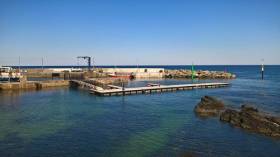Displaying items by tag: Bunagee
#Marinas - Minister of State Joe McHugh will officially open the new €1.3 million Bunagee Marine Development on the Inishowen Peninsula tomorrow afternoon (Friday 9 June).
The new safe haven for coastal cruisers, including a breakwater and pontoons to accommodate 15 vessels, was developed by Donegal County Council as part of the major cross-border project Sail West.
It also forms part of a county-wide strategy to grow Donegal’s necklace of coastal tourism infrastructure and promote the county as a top marine destination in Europe, under the MalinWaters brand shared with Sligo, Northern Ireland’s maritime counties and Western Scotland.
Ahead of the marina's official opening, Donegal County Council Cathaoirleach Terence Slowey said: “We have a wonderful marine tourism product here in Donegal and the new Bunagee Marine Development is a great addition to our existing infrastructure.
“Situated close to the beautiful village of Culdaff, Bunagee is an ideal base that will give visitors the opportunity to explore the Inishowen Peninsula and the county.”
Minister McHugh will attend the official opening at Culdaff on Friday 9 June at 2.30pm.
The project was funded by the European Union’s INTERREG IVA Cross-border Programme managed by the Special EU Programmes Body. It was constructed by Deane Public Works, and Doran Consulting was awarded the contract as the consultant engineers.





























































